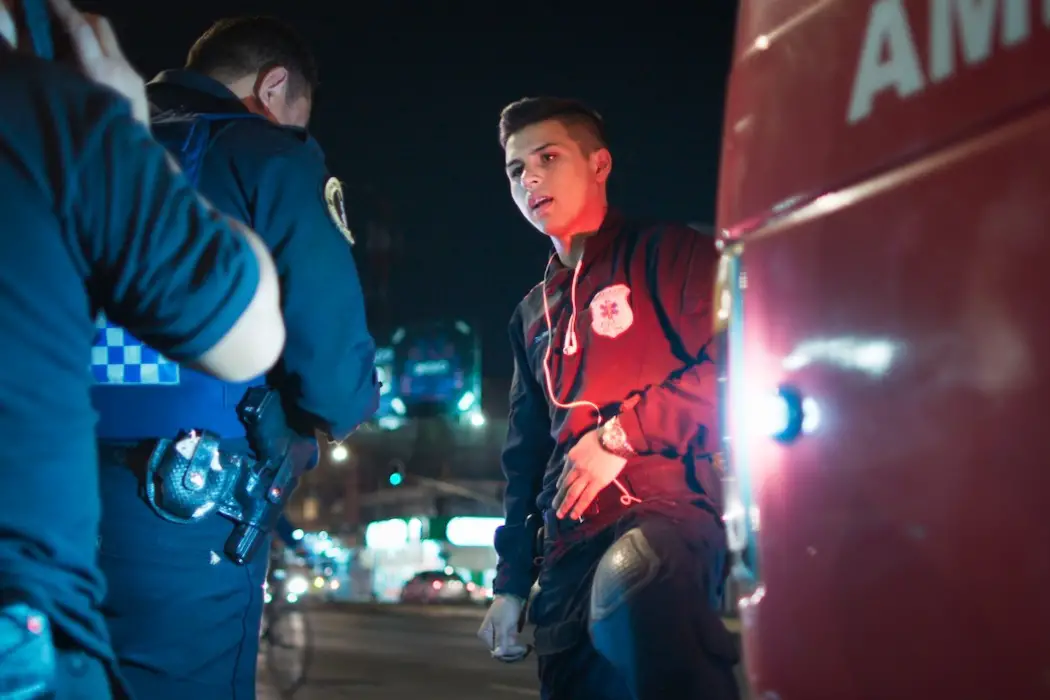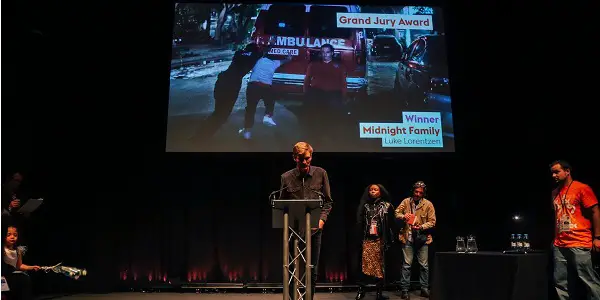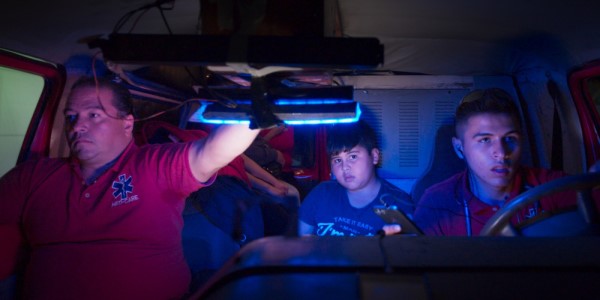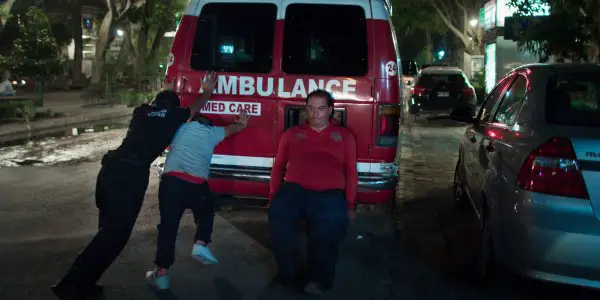“Unfortunately I Think The Situation Will Be Like This For A Long Time”: Interview With MIDNIGHT FAMILY Director Luke Lorentzen

Musanna Ahmed is a freelance film critic writing for Film…
Luke Lorentzen returned home from Sheffield with the Grand Jury Prize in his hand, winning for his film Midnight Family. It was praised by the jury for being “a technically accomplished film that combines family drama with serious moral questions” and how it “acts as a timely warning to the dangers of privatised healthcare.” I, too, was won over by this brilliant medical doc, positively comparing it to Guardians of the Galaxy in my festival coverage.
As I wrote, I wasn’t familiar with the concept of this documentary beforehand: set in a wealthy neighbourhood of Mexico City, we follow the Ochoa family making a living as one of the family-run private ambulances competing with other for-profit EMT’s to take care of patients in emergencies. I wasn’t sure what kind of tonal tightrope this unique narrative would walk on but I certainly didn’t expect it to remind me of the aforementioned Marvel movie. It’s similarly delightful and emotional, but naturally much more dramatic and vital.

I was lucky enough to bump into the director at the festival’s penultimate party, and we had a chat about, finding such a singular story, his work on Last Chance U, and the great reception his film has had in its festival run thus far, talking points which informed the questions I asked him the next day as we sat down in a more formal capacity. I caught up with Lorentzen right before Midnight Family was to screen for a second time at Sheffield Doc/Fest, just hours before he would deservedly win the Grand Jury Prize.
Musanna Ahmed for Film Inquiry: I’m sure the second screening is going to go very well, you’ve had such a great reception so far. How’s your reaction been to this amazing streak of success at film festivals?
Luke Lorentzen: It’s been beyond my wildest dreams. The festivals have been amazing. I’ve been traveling all over the world, showing the films to all different types of people and slowly learning what it’s really about. [laughs]
Let’s go back to the beginning. You told me [at the party] that you filmed over a period of three years. In that time you built the connection with this family. At what point did you decide, “I want to make their story into a documentary film.”
Luke Lorentzen: I actually moved to Mexico City thinking I was going to make a totally different film. I went there to do a series of portraits of different vehicles all around the city. School buses and cement trucks and such. Then one morning I met the Ochoa family just outside my apartment building and asked them if I could ride along.
Almost on that first day they convinced me that they were their own movie. So I abandoned everything else that I was shooting and decided to just focus on them. There aren’t many subject matters that you can film observationally and get such a range of emotions; humor, tragedy and everything in between. They were really rich characters operating in a crazy world so it was a pretty easy decision.
That multitude of rich characters and emotions was why I said that it felt to me like Guardians of the Galaxy.
Luke Lorentzen: I really love that comparison! [laughs]
But of course the difference is this is real life. We discussed how there haven’t been many texts about the subject. Why would you say that it’s not something people talk about?
Luke Lorentzen: I mean you might just need an ambulance a few times or even just once in your whole life so that’s kind of why – people don’t think about ambulances until they need them. So they’ve been able to slip under the radar. And there are a lot of people involved in the current system that are benefiting by keeping it the way it is, like most corrupt systems.
It’s not something most people in Mexico City know about and the things that are written about it tend to be skewed negatively towards the ambulance operators. They’re usually written by patients who had bad experiences going to the press and decide to make a big story about it. We’re hoping with the film we can share the story of an even keel.
Purely anecdotally speaking, I think you’re definitely on that track because when I was speaking to somebody after my screening they said to me, “At the beginning I hated the characters. But by the end I loved them.” You did tell me about one other documentary on this subject, Sofia’s Last Ambulance.
Luke Lorentzen: Yeah.
Do you know the angle that film took and what makes it-
Luke Lorentzen: I think YOU mentioned it! [laughs]
I haven’t seen it!
Luke Lorentzen: Oh! [laughs] Well okay, someone else mentioned it. Basically, it’s another well done doc takes place in an ambulance in Sofia, a city that is under surveillance. It’s a government ambulance and it’s much more of a different story for that reason. There are surprisingly few documentaries that take place in emergency medicine.

Do you imagine in the future you’ll be looking back at your film and it’ll be a time capsule for something that doesn’t exist? Or do you think that, due to the political infrastructure, means this system is going to be around for a long time?
Luke Lorentzen: Unfortunately I think the situation will be like this for a long time. I think if we’re lucky, the film can play some role in improving the situation but I can’t see a total transformation in a country that is struggling with policies on every level.
Right. Also, because the film is so observational, and the characters don’t make it obvious that they’re doing everything in front of a camera, I’d love to know if they shared with you any intention of what they want for audiences to get out of the film.
Luke Lorentzen: I think they just want to share their life with people. They acknowledge that the way they live and the way that they see this city is super unusual and exciting but also difficult, they were interested in sharing that. It’s not something people know about and they’re doing it usually in the wee hours of the night and sort of operating underground. They also just seemed excited about the idea of being part of a movie because it was fun and different from their normal routine.
I was incredibly impressed from a technical perspective by how you shot and edited it. Was it clear to you that there was a narrative structure in depicting their daily lives? Because you could have even been continuing to film right now.
Luke Lorentzen: I had a specific idea of what I wanted the structure of the film to be. I wanted it to be five or six accidents and with each accident the moral complexity increases and develops. Once I had those six accidents, six scenarios that really built on each other, I knew that I had the story I wanted to tell. And then it was a matter of filling the space in between with other threads, character development and things that tightened the stakes or provided some sort of reason for why they did what they did in an accident. So, yeah, you can keep filming for forever and it is the hardest part to just commit to the footage that you have. Like you said, they’re still doing – well not actually the exact same type of work but I could have been filming them for years… well, I was, but years in addition to all the years. [laughs]
Right. And just to put some context on your filmmaking skills – as we were talking about last night, Last Chance U, which you mentioned that in the UK you get asked about a lot more.
Luke Lorentzen: Maybe it’s just here at Sheffield. [laughs]
I understand that you cut your teeth on that as a cameraman-
[At this point, we’re interrupted by an audience member who passes by the bar and takes a moment to gush over the film to Luke]
Must be quite nice to have that immediate impact with people coming up to you.
Luke Lorentzen: Yeah, I reckon more at this festival than any other ones. There was some of this at Sundance but there’s more screenings there, many more people seeing it, whereas over here it’s just been the one screening so to already have this sort of reaction has been nice.
Have you noticed a consensus of what’s drawn people to it?
Luke Lorentzen: I’m not sure but the hope is that people are interested and excited about the idea of riding around at night in this mega city experiencing these emotional ethical dilemmas. There’s a Nightcrawler element to it.

I see. Going back to Last Chance U, how did working on that series inform your experience of making this doc? Was it before, after or concurrent to making Midnight Family?
Luke Lorentzen: It was concurrent. I started working in the camera department on the first season of Last Chance U and I was shooting SO much. Doing that year after year got me really comfortable with shooting observation. So yeah I learned how to do that through Last Chance U and applied that experience to Midnight Family. The fourth season that’s coming out in July, I was director on that but that happened after Midnight Family was complete.
I talked to some filmmaking friends of mine were particularly impressed by how you used a prime lens and one of them directed me to an article which was about how the prime lens is used to replicate the human eye in terms of focal length. Was that something you considered?
Luke Lorentzen: That’s an interesting comment. It depends on what type of prime lens you’re using. You can have a prime lens that’s very zoomed in or you can have one that’s super wide. They say that like a 50 millimeter lens is about what the human eye sees and I shot it at a 24 millimeter which is a lot wider. But you don’t get these kind of jarring zoom ins and zoom outs which are very much artifacts of the camera. Whether or not I was on a prime lens, it was separate from the decision to not want to have those sorts of zooms in the film. There’s not even very much scenes where you see me focusing. I was trying to get rid of the obvious elements of cinema and just put you in the ambulance.
After directing a successful feature film, do you think you’ll move to full-time directing?
Luke Lorentzen: Yeah I’m trying to do as much directing as possible, at least over the next year or so. A job would have to be really special for me to do camerawork again but I’m open to it if it’s cool.
You’re a young filmmaker who’s made such an astonishing feature. What advice would you give to young filmmakers?
Luke Lorentzen: Prioritize your own films. I did whatever I could to make sure that I was primarily working on my stuff. There are times when that’s difficult, particularly when you’re offered something bigger even if you’re just shooting or editing on it but you truly learn the most if you’re the one making the film. It can be hard to balance all that, especially when you need money, but it’s rewarding.
Was one of the difficulties of balancing your work going between Mississippi for Last Chance U and Mexico City for Midnight Family?
Luke Lorentzen: Yeah though the nature of Last Chance U, as a football doc, did set me up to be able to spend a lot of the year working on this film.
I just have two more questions. One is, I understand that doing the press tour takes a lot of time but is there anything else you are currently working on that you can tell us about?
Luke Lorentzen: Nothing that I can unfortunately tell you but I’m developing two new films that will develop on Midnight Family in interesting ways. Neither are in Mexico but, stylistically, they are in a similar realm. I’m hoping to start production on one of them in September or October.
The last question I have is when can audiences in the UK and US expect to see Midnight Family?
Luke Lorentzen: It will be released in theaters in the US sometime around the beginning of November. It will be released in the UK in theaters early 2020 so kind of a while. [laughs] There’ll be more festivals before then though.
Film Inquiry thanks Luke Lorentzen for taking the time to talk with us.
For those interested in Midnight Family’s upcoming distribution plans, you can find screening updates at its official website.
Does content like this matter to you?
Become a Member and support film journalism. Unlock access to all of Film Inquiry`s great articles. Join a community of like-minded readers who are passionate about cinema - get access to our private members Network, give back to independent filmmakers, and more.
Musanna Ahmed is a freelance film critic writing for Film Inquiry, The Movie Waffler and The Upcoming. His taste in film knows no boundaries.












